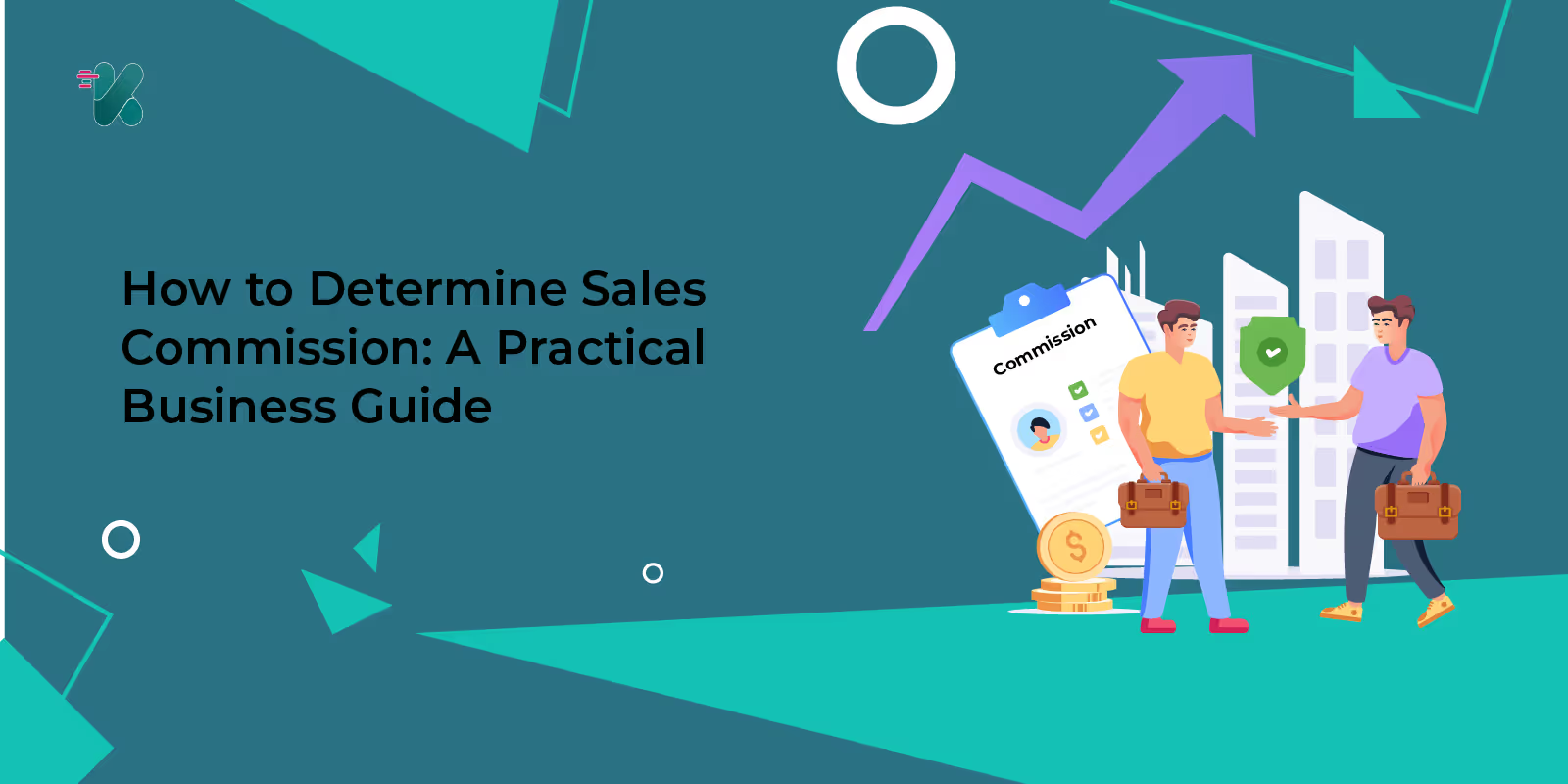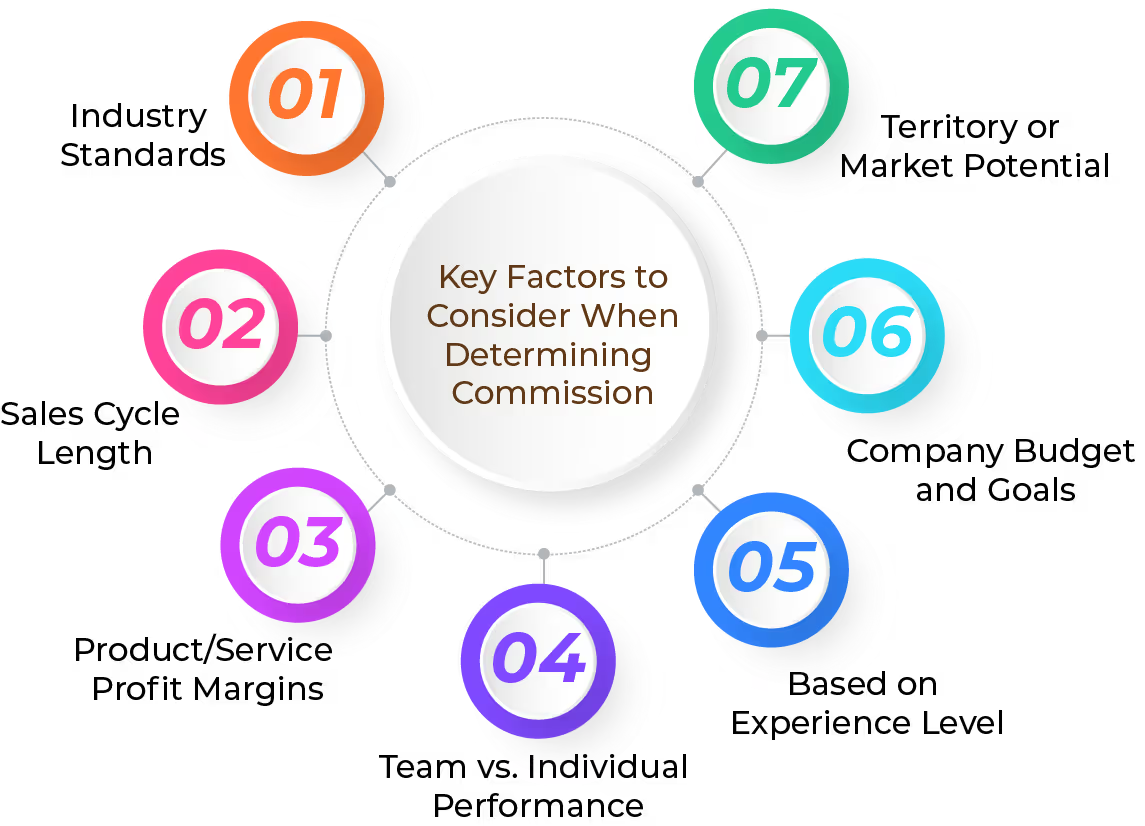
Blog
How to Determine Sales Commission: A Practical Business Guide
May 15, 2025


Key Insights
You see your salesforce working tirelessly.
They are successfully bringing in business, closing deals, and contributing more than anyone to the growth of the company. The results speak for themselves.
But at the end of the month, something’s off.
You notice the lack of excitement and the evident disappointment on seeing the paycheck.
So why don't you give them what they truly deserve?
The reward that reflects their hard work.
The commission for every sale they close.
Confused on where to begin? We have a practical business guide on how to determine commission for your salesforce.
What is a Commission?
A commission is a reward you give your sales reps to recognize their performance, whether it's closing a deal, achieving a milestone, or exceeding targets.
Commissions are usually monetary rewards tied directly to the sale of a product or service. This financial reward not just boosts sales motivation but also impacts the overall performance and drives higher output from the sales rep.
For example, a sales rep in the SaaS industry will be offered 10% of the total sales value. So if they make a deal worth 1 lakh, then Rs 10,000 will be received as commission in addition to their monthly salary.
When structured properly, commissions play a great role in accelerating revenue generation and business goal attainment.
Why Do Commission Structures Matter?
Commission structure is more than just a payout plan. It gives a foundation to your incentive program by answering these questions:
- How much does a rep earn per sale?
- What qualifies for a commission?
- Are there thresholds or limits?
- Is the commission flat or variable?
Having this framework helps sales admins efficiently manage the incentive program while providing transparency and clarity to sales reps.
When reps clearly understand how their commissions are calculated, it reduces confusion, builds trust, and encourages consistent performance.
Sales reps will be encouraged to push harder to close deals and exceed expectations. They will become more accountable for their job, and their sales behaviour will align with the business goals.
Ultimately, a well-structured commission plan will make your incentive program fair, predictable, and performance-driven. This will not only improve employee performance and engagement but also help retain top performers.
Types of Commission Structures
Commission structures are a big deal when it comes to running your incentive program successfully. Which means you need to know what the different types of commission structures are out there to make the best decision.
So here is a list of commission structures, their pros and cons, that will help you while deciding which best suits your sales process:
It takes both in-depth and broad research to understand and decide what actually fits your requirements and to make choices that truly drive results.
Key Factors to Consider When Determining Commission
Knowing different commission structures does not suffice.
You need to consider some key factors related to your industry, sales cycle and process before deciding how to determine commission that actually works for you.
So here are some key factors to consider when determining your commissions.

Industry Standards
Knowing the industry benchmarks and the competitors' offers helps make the right choice.
Sales Cycle Length
Sales cycle length matters when choosing your commission. Longer the sales cycle, higher the commission to keep the salesforce motivated.
Product/Service Profit Margins
Commissions should be paid according to the profit you make. The higher the profit margin, the higher your commission should be.
Team vs. Individual Performance
You should decide whether you are rewarding individual or teamwork work, or both.
Based on Experience Level
Tailor your commission structure based on experience. While a new hire requires ramp-up incentives, a senior sales rep can be incentivized based on performance.
Company Budget and Goals
Choose commission structures that align with both your company budget and overall business objectives.
Territory or Market Potential
Commission rates should be set based on factors like opportunity size, demand levels, and market penetration.
Considering these factors will help in choosing commissions that best suit your salesforce, business model, market dynamics, and competitive landscape.
How to Calculate Commission?
Commission calculation varies depending on your commission structure.
But the general formula is:

Let us take some of the commission structure to analyze how commissions are calculated:
Flat-Rate Commission
In a flat-rate commission, sales reps get a fixed commission rate irrespective of the deal value.
Example:
Sale = Rs100,000
Rate = 5%
Commission = Rs10,000 × 0.05 = Rs5000
Tiered Commission
In a tiered commission structure, the rates increase as sales hit higher targets.
Example:
Commission Slabs:
- 5% for the first ₹100,000
- 7% for the next ₹100,000
- 10% on any amount beyond ₹200,000
If total sales = ₹250,000
Commission = (₹100,000 × 5%) + (₹100,000 × 7%) + (₹50,000 × 10%)
= ₹5,000 + ₹7,000 + ₹5,000
= ₹17,000
Profit-Based
Profit-based commission is calculated as a percentage of the profit made.
Example
Sale = Rs10,000, Cost = Rs7,000
Profit = Rs3,000, Rate = 10%
Commission = Rs3,000 × 10% = Rs300
Legal and Ethical Considerations
Just like any other employee payments, sales commissions also fall under the labour regulations. This means companies must be aware and comply with the compensation regulations.
So here are a few things companies must keep in mind about the legal and ethical considerations of sales commission:
- Ensure you adhere to wage laws, including minimum wage and overtime pay, and get your commission agreement written.
- Document how commissions are earned, calculated, and paid to avoid disputes and legal action.
- Make sure to pay the commissions on time.
- Your commission structure should not discriminate against employees based on gender, race, caste, culture, age, etc.
- Encourage ethical selling by not incentivizing manipulative sales tricks.
As long as you keep things fair, transparent and within legal limits, your commission structure will reap results for both the company and the sales team.
Tips for Setting a Fair and Effective Commission Plan
Now you have gathered everything that you need to know about sales commission. But before you leave, here are some tips and hacks that will come in handy:
💡Align your commissions with business goals.
💡Keep the commissions simple and clear.
💡Be flexible and open to change.
💡Communicate everything clearly with your team
💡Review sales performance and give constructive feedback.
Keeping these tips in mind at all stages of commission management will get you on the right track for success.

Common Mistakes to Avoid
As you start running your commission plan, handling many sales reps and their incentives, mistakes will creep in that go unnoticed.
But caution is good. Regular checks are good.
So here are a few common mistakes that you must look for and avoid to make your compensation plan seamless and running.
❌Do not complicate your plan with too many rules.
❌Do not ignore industry benchmarks and best practices.
❌Do not lose sight of aligning efforts with business goals.
❌Do not allow miscommunication with your sales reps.
❌Do not take a one-size-fits-all approach to sales rep rewards.
❌Do not let your sales plan remain stagnant as the market evolves.
❌Do not delay commission payouts.
❌Do not fall short on compliance with labor laws and regulations.
These points might seem small or routine, but even a single misstep can throw your entire sales compensation plan off track.
Conclusion
You have gathered all the insights about sales commissions.
But still wondering how to determine commissions that can supercharge your business growth and unlock peak performance?
Then you need to upgrade your incentive plan to match today's fast-paced sales environment.
That is where Kennect, as an incentive automation tool, steps in to make a difference.
Kennect is more than just an incentive compensation automation tool; it’s designed to transform your sales processes.
With AI-driven nudges, seamless no-code functionality, and robust compliance features, Kennect ensures your sales teams stay motivated and aligned with business goals.
If you're on the journey to plan and optimize your sales commission, the final milestone is embracing Kennect.
Want to discover how Kennect streamlines your commission management and drives better results? Book A Demo TODAY.
FAQs on Determining Commission
- What is a good commission rate?
A good commission rate depends on each industry, product margin, sales cycle, role, experience, etc. For example, a typical commission rate for SaaS is 10-30% of the sales volume, while in real estate, you get 1-3% of the property value.
- How do startups handle commission?
Startups have a more flexible approach to commissions primarily often due to tight budgets. So they typically mix commission plans that include base salary and performance pay to motivate reps while staying aligned with business goals.
- Can commissions be capped?
Yes, commission can be capped. Companies place a limit on the amount of incentive a sales rep can earn. Once reaching that limit, sales reps stop earning commission for any additional sales for that quarter or year.
- How do you track commissions effectively?
Incentive compensation management tools like Kennect will help you rack commissions effectively. We automate sales calculations, sync sales data, and offer real-time visibility. This reduces errors and saves time and ensures clarity, transparency, and trust and on the incentive plan.
ReKennect : Stay ahead of the curve!
Subscribe to our bi-weekly newsletter packed with latest trends and insights on incentives.
Thank you! Your submission has been received!
Oops! Something went wrong while submitting the form.
Your data is in safe hands. Check out our Privacy policy for more info











